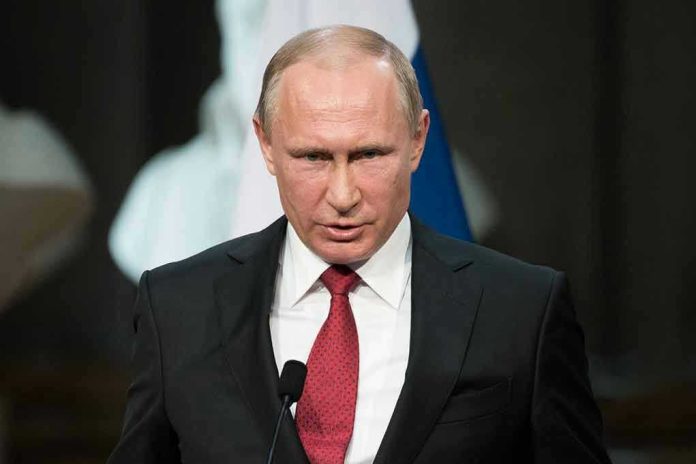
Kremlin officials have moved swiftly to assert that only Vladimir Putin determines Russia’s foreign policy, directly dismissing fiery nuclear threats made by Dmitry Medvedev in the wake of President Trump’s renewed military pressure.
Story Snapshot
- Kremlin clarifies that President Putin alone sets Russian foreign and nuclear policy, sidelining Medvedev’s threats
- Medvedev’s recent references to Russia’s “Dead Hand” nuclear system prompted U.S. nuclear submarine deployments
- Trump’s administration has responded to Russian rhetoric with direct military action and public deadlines
- Analysts view Kremlin’s move as an effort to reduce nuclear escalation risks and reinforce Putin’s authority
Kremlin Reins In Medvedev After Nuclear Threats Heighten U.S.-Russia Tensions
On August 4, 2025, Kremlin spokesperson Dmitry Peskov publicly declared that Russian President Vladimir Putin is the sole decision-maker on Russia’s foreign policy, distancing the government from Security Council Deputy Chair Dmitry Medvedev’s repeated nuclear threats. This came just days after Medvedev referenced Russia’s “Dead Hand” automatic nuclear retaliation system during a public exchange with former President Donald Trump, heightening global fears of nuclear escalation. Peskov stated, “Russia is very cautious about nuclear nonproliferation matters, and we believe everyone should be very careful about nuclear rhetoric,” effectively sidelining Medvedev’s statements as unofficial and non-binding.
The Kremlin’s intervention followed a tense series of exchanges: Trump had issued a 50-day deadline for Putin to negotiate a Ukraine peace deal in early July, prompting Medvedev to dismiss the ultimatum and escalate with nuclear saber-rattling by July’s end. In response, on August 1, Trump ordered the redeployment of two U.S. nuclear submarines, signaling a willingness to counter Russian threats with military resolve. This rapid sequence of action and reaction left international observers on edge and underscored the volatility inherent in high-level nuclear brinkmanship.
Internal Messaging Discipline and U.S. Military Readiness
The Kremlin’s public contradiction of Medvedev marks a rare display of internal messaging discipline at a time of heightened U.S.-Russia tensions. By making clear that only Putin’s statements reflect official policy, the Kremlin seeks to reassure both domestic and international audiences that Russia is not on a hair-trigger for nuclear war. Trump’s actions, meanwhile, demonstrate a return to muscular U.S. military posturing after what many conservatives viewed as years of weak or ambiguous deterrence under the prior administration. U.S. military and national security officials have confirmed that the submarine deployments are intended as both a signal of strength and a practical measure against unpredictable Russian behavior.
Analysts from the Institute for the Study of War and the Nuclear Threat Initiative agree that Medvedev’s role is often to introduce extreme positions—serving as a “bad cop” and testing Western resolve—while allowing Putin to later appear more moderate. This tactic, however, is not without risk. The repeated need for the Kremlin to walk back Medvedev’s statements could undermine Russia’s credibility and increase the danger of catastrophic miscommunication between nuclear powers. Experts warn that while the immediate risk of escalation may have receded after Peskov’s clarification, the underlying issues fueling the standoff remain unresolved.
Broader Impact: Negotiations, Military Posture, and Global Anxiety
Trump’s re-engagement in U.S.-Russia relations, including the imposition of new deadlines and threats of economic sanctions, has shifted the diplomatic landscape. The Kremlin’s efforts to manage Medvedev’s rhetoric highlight a broader strategy of centralizing power and message control around Putin. This not only reinforces the Russian president’s negotiating leverage but also signals to Western governments that unofficial voices, no matter how high-ranking, do not dictate state policy. Still, the episode has temporarily raised the risk of miscalculation, with global markets and European governments closely monitoring for signs of further military escalation or progress in Ukraine peace talks.
For American families and taxpayers, the core concern remains the stability and credibility of U.S. deterrence in a world where adversaries frequently resort to psychological warfare and provocative rhetoric. The prompt and clear response from the Trump administration stands in contrast to what many saw as the prior administration’s lack of resolve. At the same time, the Kremlin’s walk-back of Medvedev’s threats serves as a reminder of the importance of strong, steady leadership and the dangers of unchecked government actors. Going forward, the episode may set a precedent for how both nuclear powers manage internal dissent and public signaling during moments of crisis.
Expert Perspectives on the Dangers of Nuclear Brinkmanship
Security experts emphasize that clear lines of authority and disciplined messaging are essential for preventing accidental escalation between nuclear-armed states. The Institute for the Study of War has documented the Kremlin’s repeated use of Medvedev for nuclear saber-rattling, but consistently notes that Putin and his senior officials retain real authority over Russia’s arsenal. The Nuclear Threat Initiative has specifically warned against the dangers of reckless public threats, calling for restraint and careful signaling from all parties involved. Academic analysts, meanwhile, argue that while Medvedev’s provocations may serve a strategic purpose, they also risk eroding the Kremlin’s credibility if routinely walked back in public.
The consensus among credible sources is clear: only Putin sets Russian foreign policy, and the current crisis demonstrates the necessity of disciplined leadership on both sides. The episode offers a sobering example of how quickly rhetorical escalation can draw the world to the brink, underscoring the stakes for American security, constitutional values, and global peace.
Sources:
Institute for the Study of War




